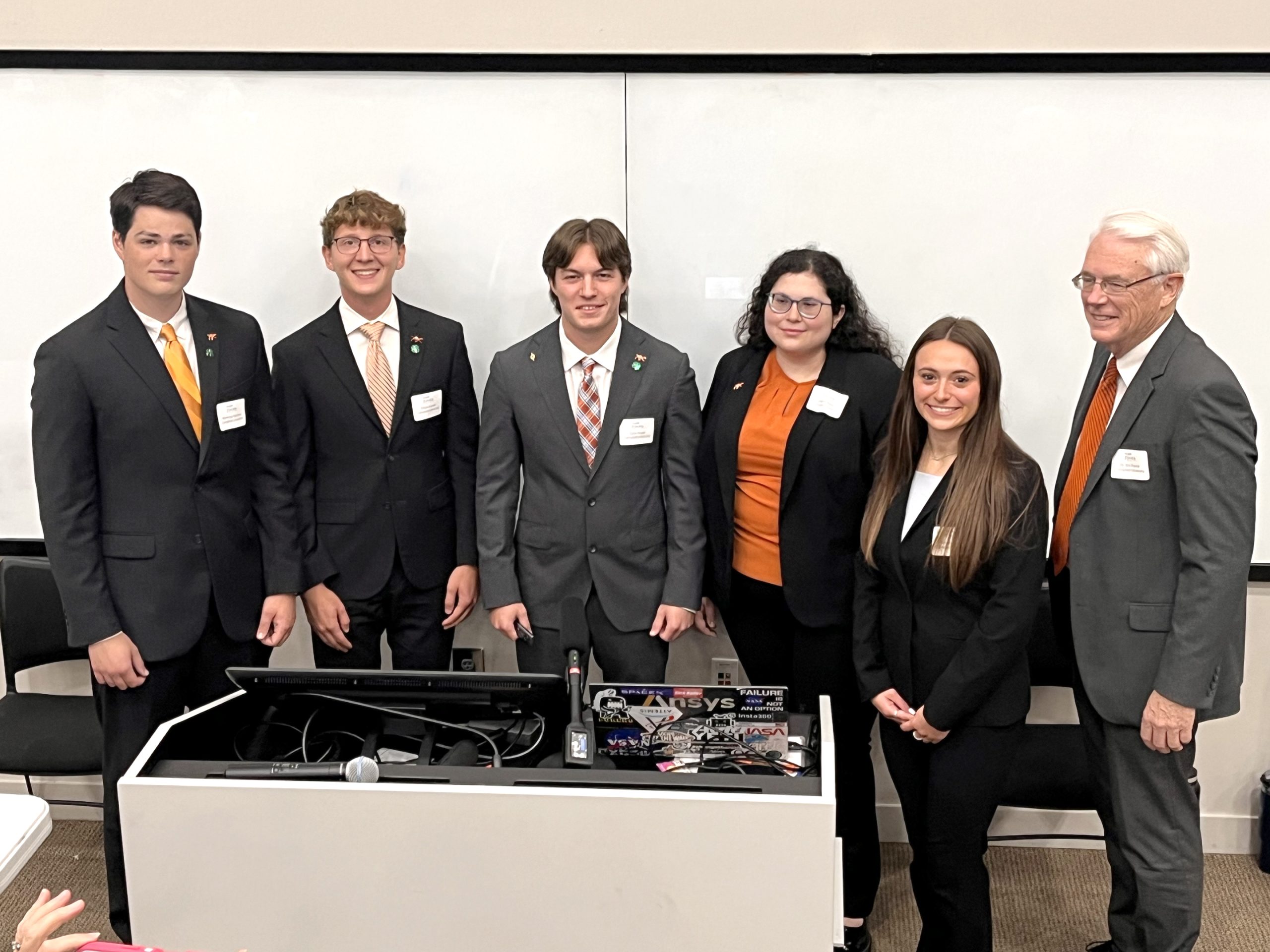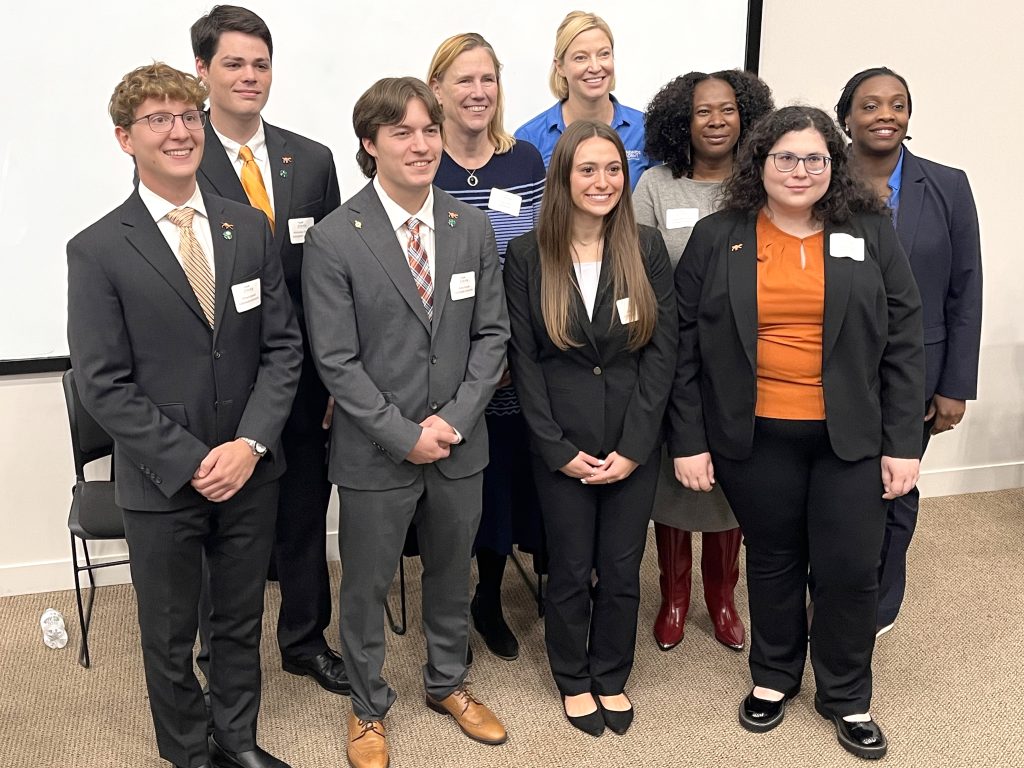Campbell only university in country invited to participate in DiscoverE Future City Fellowship
Raleigh is one of the country’s fastest growing cities, and with more people comes more energy use. A group of Campbell University engineering students (and one political science student) were tasked with drawing up a plan to power the city over the next 30 years while cutting down costs for residents and improving the environmental impact.
The Future City Fellowship, in its pilot year, is an extension of the Future City Competition from Discover Engineering, a nonprofit committed to sparking students’ interest in engineering, strengthening their STEM skills, and deepening their knowledge. Over the last year, DiscoverE partnered closely with safety science nonprofit UL Research Institutes to develop this unique fellowship for undergraduate students focused on the importance of safety standards in researching, modeling and designing a safe and sustainable city decades in the future.
Campbell University’s team of Emma Golden, Zane House, Ethan Kessler, Nicholas Ramsey and Angela Steen are part of a pilot project for university students to take part in the competition, according to Dr. Kim Fowler, associate professor of engineering and the team’s faculty lead.
“Our team took the project in a different direction; they treated it like a consulting effort for the City of Raleigh, which was very different from developing a simulation or model,” said Fowler.
The team developed 10-, 20- and 30-year plans to electrify Raleigh using solar panels, electric vehicles and small modular nuclear reactors. Along the way, the students used ULRI’s new Standards Academy platform that was created in close collaboration with standards development experts at UL Standards & Engagement to reference case studies on electrification and the importance of adhering to safety standards when designing their future city.
The students also met with officials from the City of Raleigh, Duke Energy, DiscoverE and UL Standards & Engagement in what Fowler called “a very realistic professional scenario emulating actual consultants.”
The team met once a week starting in March and issued their public presentation on Oct. 15 in Maddox Hall. The first university team to take part in the Future City Fellowship, Campbell will be joined next year by two additional collegiate teams.
“We are honored that DiscoverE invited Campbell Engineering to be the only pilot collegiate team in the Future City Fellowship this year,” Engineering Dean Dr. Jenna Carpenter said. “UL Research Institutes was a great supporter of this effort. ULRI’s Institute for Research Experiences & Education helped develop this fellowship with DiscoverE and served as the fellowship’s founding partner and sponsor. We appreciate the City of Raleigh and Duke Energy serving as our partners on the project and Dr. Kim Fowler for serving as their faculty mentor. We are really proud of the outstanding job that our students did, and we are looking forward to fielding a team again next year.”

THE PLAN
During their presentation on Oct. 15, the students laid out their consultation plan to “electrify Raleigh safely, sustainably and equitably” over the next 30 years. Their plan explored strategies in not only technical infrastructure, but community needs and government policies as well.
The presentation showed that Raleigh’s energy usage has tripled since 1960 and will continue to grow through 2053. One model suggests the city’s current usage could nearly double again in the next 30 years.
The team’s plan was broken down into 10-year increments. In the next decade, they suggest the city invest in solar power. In the next 20 years, it should have developed and completed a plan to implement electric vehicles into the city’s fleet and provided convenient resources for EV owners. And over the next 30 years, Raleigh needs to invest in small modular nuclear reactors, which they say are a cleaner and safer energy alternative.
The solar plan calls for more solar panels on roofs in new and existing residential areas and new solar power generating canopies over existing parking areas. It also suggests high energy-consuming structures like the Neuse River Water Treatment plant can save the city thousands by relying solely on solar energy.
The team pointed out that Raleigh is currently home to 436 public charging stations. Their plan builds on that with more stations and a transition from gas to electric for all city vehicles. It also suggests using solar power at new EV charging stations, essentially killing two birds with one stone in some areas.

And for the modular nuclear reactor suggestion, the team pointed out that North Carolina is currently home to four nuclear power plants, the closest being the Shearon Harris plant near the Wake-Chatham county line south of Raleigh. The team suggests adding the small reactors to the Harris plant, which currently has three available reactor licenses, and converting old active and inactive coal plants (such as one along the Cape Fear River) into nuclear power producing areas.
According to Emma Golden, the lone political science major on the team and an honors student, whether or not the City of Raleigh takes the team’s consultation to heart doesn’t take away from the experience and education the competition afforded them.
“I gained hands-on experience working in an interdisciplinary team … I learned how to connect technical innovation with political and legal feasibility and to understand how zoning laws, equity considerations and long-term planning affects implementation,” Golden said. “This project strengthened my ability to think across disciplines and communicate with engineers, planners and stakeholders. I definitely plan to use this experience in my future legal and policy career.”

